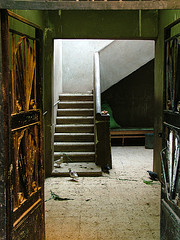Constructivism and the Open Participatory Learning Infrastructure

Okay, over the next weeks this blog will become a bit mixed up with German and English stuff, but I try to focus my blogging on this Blog, so stuff like this will take over this former educational blog used for a seminar “Serious Games and Sims for Education”. My work blog will continue to be a kind of blogfolio of my recent activities at University Bremen, for example the abstract of my upcoming presentation about “YOU learning – the impact of user generated content on education”.
Enough of this shameless self-advertising… Somehow I got into Aggregator mode last evening, so I became serious with Google Reader, which is still in the labs, but much improved since my last visit (now if they would only support search in your feeds…). Expect more stuff to be shared there in future, look to the right bottom of this page for new shared stuff.
While happily aggregating all my newsfeeds into Google Reader, I saw Grahams report about Developing an Open Participatory Learning Infrastructure. It is always good to know, where this lucky bastard fellow is hanging around, because he has a knack for being at very interesting places. Sitting just one floor above his office in Bremen for six months has proven to me, that it is easier to catch his blog than himself 🙂
Back to the point – Graham blogs from Texas about the presentation of the Review of the Open Educational Resources (OER) Movement: Achievements, Challenges, and New Opportunities – a very interesting read, for commentary on that please also read Grahams blog entry.
What I found striking is that I was just wondering: “what all of the great names of the constructivist educational technology movement are doing right now?” – “What has happened to Jasper Woodbury and all the other projects?” – “Where and what is the new stuff?” – “Is Web 2.0 the poor man’s constructivist toolkit?”.
And then I read Graham’s blog and – KAZAAM – one of them is directly back (well, maybe he wasn’t away at all, but have a look at the link below for some proof) into my field of vision: John Seely Brown is one of the co-authors of the report.
Now what fresh food gives that to my inquiring mind? User generated content (UGC), Open Something and Web 2.0 is the technical reflection of constructivist thinking in the educational technology discourse from A (Alan Kay) to Y (Yasmin Kafai) – brought to the masses via GooTube, Wikipedia and everyone else trying to get his/her five minutes of fame on TechCrunch.
It will be very interesting to see, if the old problems of constructivist education to become mainstream schoolthinking will be solved by providing tools which are cheaper and easier to use than for example StarLogo or Squeak. Maybe the constructivist old school was too keen on using tools (programming environments) to make stuff, empowering people to redefine and rebuild everything in a very smalltalkish way – often loosing the teachers in the process. In contrast, UGC and Open Educational Resources is more about content and knowledge, which are products of design processes.
It is funny that a resource question (there is just not enough money for good educational resources for all)
may finally bring constructivism or even constructionism into the educational mainstream.
A lot of big questions need to be answered, such as how to nurture quality in open settings without getting spammed away? How many shades of Open are needed? Not to be answered today…
Update #1: New John Seely Brown Sightings!
OK, maybe I just didn’t pay attention enough. There is a nice presentation from JSB at the MIT iCampus streamed for you here. It is a nice talk, nothing earth shattering new, but with nice examples. The content is drawn mostly from this article New Learning Environments for the 21st Century: Exploring the Edge in Change. See also Stephen Downe’s critique on John’s report. To follow up on that, re-mixing would have been a better approach than repurposing. I don’t see too much value for repurposing in education. I would like to have better resources, but not one resource repurposed for everything. For ages in books we are doing quoting and re-mixing, why not in Open Educational Resources?